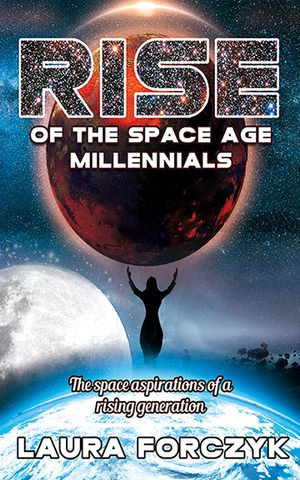Review: Rise of the Space Age Millennialsby Jeff Foust
|
| “In this book, you won’t find any stories about entitled, fragile young adults unable to make it in the real world,” she writes. |
Millennials might feel misunderstood, but the same is true for almost any generation at some point in time. Their voices and views about space come through loud and clear in Rise of the Space Age Millennials by Laura Forczyk, owner of the space consulting firm Astralytical and herself part of that generation. She interviewed more than 100 fellow millennials who are involved in space in one way or another, from engineers to scientists to businesspeople, about their visions for space and their roles in it. The results are both enlightening and reassuring.
“In this book, you won’t find any stories about entitled, fragile young adults unable to make it in the real world,” she writes in the book’s introduction. “Here you will find hard-working individuals within the space sector who exhibit optimism, hope, adaptability, futuristic long-term thinking, and a desire to bring along everyone for the ride.”
The people interviewed for this book indeed express optimism and long-term thinking. In many respects, though, their views are not that different from previous generations. In one chapter, millennials are asked what the next steps for human spaceflight should be. Their responses cover the range of options long considered—back to the Moon, Moon as a steppingstone to Mars, and direct to Mars—without any clear consensus. Some even back an “Apollo-like” approach for a lunar return or Mars expedition, despite the fact that such an approach was, by definition, not sustainable.
There are some differences, though. “By far, the top inspiration for millennials has been the emergence of the commercial space industry and its superstar: SpaceX,” Forczyk writes, which makes sense given SpaceX’s prominence in recent years as many millennials were coming of age deciding to pursue space-related careers. What inspired earlier generations, like Apollo and the Space Shuttle, are now history.
One of the final chapters examines generational differences between millennials and older generations, such as how they interact at work and the values they hold. Yet, even here it’s not clear that the divisions between millennials and boomers are as wide as might be stereotyped elsewhere: some of those interviewed acknowledged the differences could be chalked up to age and experience rather than fundamental differences between the generations. (Boomers, after all, included both hippies and yuppies—or people who were once hippies and later became yuppies.)
There are, though, some caveats to the conclusions drawn in the book. The vast majority of millennials interviewed for the book are from the US, with just a handful from other countries, so the views held by millennials in America may not always hold true to those in Europe, Asia, or elsewhere. Also, the book focuses only on those millennials tied to the space field in some way, so we don’t get a chance to compare their views with those of millennials in general.
| By far, the top inspiration for millennials has been the emergence of the commercial space industry and its superstar: SpaceX,” Forczyk writes. |
For those who are interviewed, the book is exhaustive—in more ways than one. In each chapter, Forczyk allows dozens of millennials to chime on topics ranging from exploration destinations to acceptance risk. That process can become repetitive, though, particular lythe way it’s structured and the decision not to use the full name of participants (instead, we have identifiers like “Engineer Genevieve in Texas” or “CEO Scott in Florida.”) Thus, we get paragraph after paragraph that begin like “Engineer Nathan in Colorado believes…” or “Aerospace engineer Yasmin in Florida believes…” that, while ensuring everyone gets their say, can get a little monotonous.
An underlying message in Rise of the Space Age Millennials is that many of fundamental reasons why millennials are interested in pursuing space-related careers, and the directions they both want their careers and the overall field to go, are not much different from those of earlier generations. They may differ in other areas, but in space their visions are not that far apart.
Note: we are temporarily moderating all comments submitted to deal with a surge in spam.
